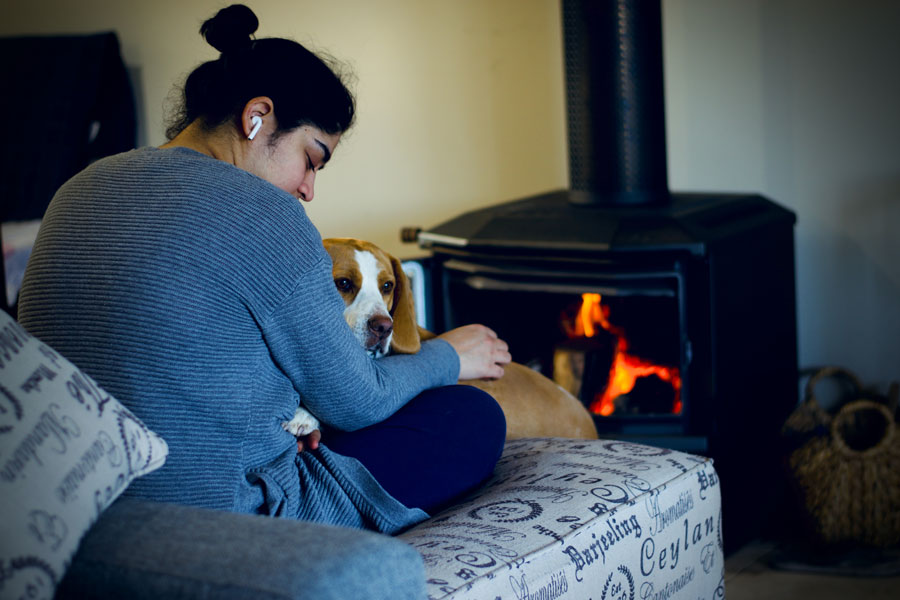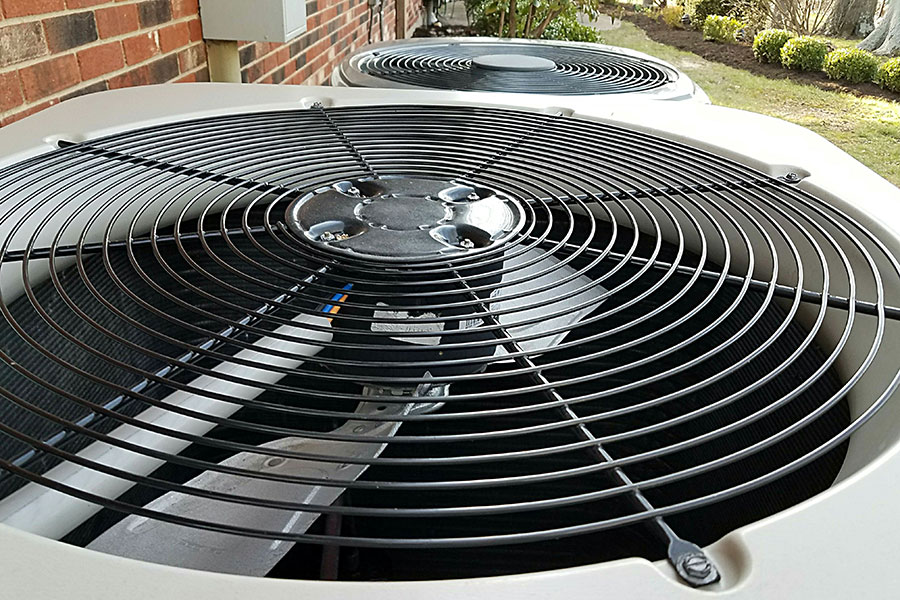
Heating and Cooling Solutions
One of the best ways to save money this winter is upgrading your home with an ENERGY STAR certified smart thermostat. The intuitive functions of smart thermostats open up a variety of options for you to customize your home’s settings and save money. If you have ever asked “Do smart thermostats save money in the winter?”, we’ve laid out the top benefits of smart thermostats to answer your question.
Why is ENERGY STAR Certification Important When Choosing a Smart Thermostat?
ENERGY STAR products have been verified by the United States Environmental Protection Agency to use less energy than standard products on the market. Using products that save energy creates a positive domino effect for your home and heating bills. Saving energy means saving extra work for your home, which means saving money on your heating bills. So, when you choose to use an ENERGY STAR certified smart thermostat, you are choosing a device that’s been verified to save energy, therefore saving you money.
At Mountain Heating and Cooling, we use ENERGY STAR certified products like Nexia and Trane smart thermostats to ensure your heating and cooling systems operate efficiently and cost-effectively. We use a variety of ENERGY STAR certified products, so you can consult with one of our experts to decide which of our recommended brands works best for your home.
How Do Smart Thermostats Save Money in Wintertime?
When the temperature outside drops, you typically react by cranking up the temperature inside of your home. However, this can easily lead to hefty heating bills and a lighter wallet. Smart thermostats allow you more opportunities to better regulate your heating and cooling system and optimize your home to save energy. If you’re wondering how do smart thermostats save money in the wintertime, we’ve listed the top energy-saving features of smart thermostats.
Programmable Temperature Settings
One of the main benefits of smart thermostats is being able to program custom heating and cooling settings. Smart thermostats allow you to schedule what time of day the heating kicks on or turns down, so you don’t waste extra heating power while you are away from home. During the winter, if your home has a lower interior temperature, this means you have a slower loss of heat. The slower your loss of heat, the more energy you save in the long run.
The U.S. Environmental Protection Agency recommends setting your smart thermostat to 68°F while you are at home and setting it at a lower temp while you’re asleep or away from the house. You can even save as much as 10% a year on your heating bill by turning down your thermostat by 10°F for 8 hours a day.
Uses Real-Time Weather Information
Many of the most popular smart thermostats on the market use real-time weather data to gauge what to set your home temperature at. Smart thermostats that connect to the internet can access information about the weather conditions outside of your home. Using this information, your smart thermostat can adjust the temperature of your home accordingly to save money and increase efficiency.
Accessible Setting Scheduling
One of the most convenient features of smart thermostats is their scheduling accessibility. Many smart thermostats allow you to program and adjust your home’s smart thermostat from your tablet, computer, or smartphone. You can easily lower your home’s heating temperature when you’re at the office or on vacation, helping you save energy and money.
Chat with Smart Thermostat Installation Experts
If you’re interested in installing a smart thermostat in your home this winter, reach out to the HVAC experts at Mountain Heating & Cooling. We have years of experience in finding the perfect solution for your heating and cooling needs. We know smart thermostats inside and out, and we will take the time to get to know your needs to make sure we fit the right system and model to your home. Give us a call to arrange an appointment today.

Heating and Cooling Solutions
Winter is not an easy time for your energy bill. In the colder months, you typically use more energy to heat the entire home. The constant use of heat can not only raise your bills, but it can overwork your HVAC system and lead to leaks and breaks. The last thing you want to deal with during the winter is a broken furnace. No one wants a chilly house. To keep your heating and cooling systems running efficiently and your energy bills manageable, it’s important to know how to make your home energy-friendly. A great measure of your home’s energy efficiency is the Energy Star rating system.
What is the Energy Star rating system?
Energy Star—trademarked as ENERGY STAR— is a federal voluntary program operated by the U.S. Environmental Protection Agency (EPA). Energy Star educates people on how to save money and improve the environment through energy efficiency, much of which starts in the home. To help home and building owners select energy-efficient products Energy Star researches, identifies, and promotes products that fit their standards and place their “seal of approval” on these products. They even have an Energy star rating system to show which products are the most energy-efficient and, therefore, “Energy Star Certified.”
Using tips and tricks from the Energy Star, we’ve put together a guide for keeping your electrical bills low and energy rating high during the wintertime.
Winter Energy Efficiency Guide
Regularly Change Your Air Filter
Dirty air filters slow down airflow and make your HVAC system work harder to keep your home warm. This not only wastes energy, but it overworks your system and increases your heating bill. During heavy use months, like the winter and summer, check your air filter every month. Folks often ask us how often they should change their air filter, and the answer depends on how dirty or clean it is. If it looks dirty, replace the air filter immediately. Leaving an air filter unchanged can lead to expensive maintenance or early system failure later on. If it is clean, air filters can last up to three months unchanged.
Tune or Replace HVAC Equipment
Just like regularly visiting the dentist for a cleaning, checking and tuning your HVAC equipment every year can improve its efficiency and your comfort. Ideally, have your system checked before the winter season hits so you can catch and repair any small problems before the cold weather settles in.
Since 50% of your utility bill goes into heating your home, having your furnace inspected regularly can help you save money in the long run. We recommend checking and fixing your furnace about once a year for optimal performance. With the tune-ups, remember to change your furnace filter every month or as prescribed by the manufacturer. This will help regulate the proper flow of warm air throughout your home.
If your furnace is outdated (10 or more years old) or broken beyond reasonable repair, contact an HVAC professional for furnace installation services. Many HVAC companies, like Mountain Heating and Cooling, have furnace options that are Energy Star verified, so you can have peace of mind knowing you’ve made the right choice for your space.
Clean and Check Vents
Your heating system runs best when there is nothing obstructing the flow of air from returns and vents. Having clogged or blocked vents can cause your heating system to overwork, putting out more energy than is actually needed. To ensure your vents’ efficiency, regularly clean vents by removing dust and debris. Also, move any furniture or items that are blocking your vents.
Find and Fix Leaks
Drafty windows and doors can cause nearly one-third of your home’s heat to escape. Before the cold winter air sets in, it’s important to find and fix any leaks that are draining your heating system and bank account. Things to look for leaks include cracks around ducts, window frames, doors, vents, and chimneys. You can often seal these with weatherstripping and caulking. For an expert’s advice, reach out to an HVAC professional like Mountain Heating & Cooling for an in-depth home inspection.
Now is better than later to start preparing your home for the winter. When the cold air and snowy weather hits, it can often be an inconvenience to make major changes that impact your HVAC system. To ensure your peace of mind and keep your energy bill low this winter, schedule an HVAC system check with Mountain Heating & Cooling. Our team has years of experience finding the perfect solutions for your home. We take the time to know your needs to make sure we pair the right system and model to your home. Give us a call to schedule your appointment today.

Heating and Cooling Solutions, Service
During the hot months, you want to make sure your air conditioner is blowing ice cold, clean air. For that to happen, your unit will need to be running smoothly and efficiently. Air conditioner repairs can be costly, and no one wants to deal with the air conditioner leaking or failing on a hot summer’s day. To avoid that, it pays to learn about common air conditioning problems so that you can take preventive measures to avoid huge repair bills. At Mountain Heating & Cooling, we’ve put together a list of four of the common things to watch out for this summer so you can keep your home cool.
Air Conditioner Leaking
One of the common questions we get from folks is “why is my air conditioner leaking?”. Air conditioners can leak for a variety of reasons, the most common being a clogged condensate drain line. Over time, this line can become clogged with debris like dirt or dust, which can lead to the unit leaking inside your home. Essentially, when the condensate drain line gets clogged, water can’t escape and drain to the outside of the home, so instead, it gets backed up and leaks water inside your home. Air conditioner leaks can also stem from dirty air filters or low refrigerant. As the refrigerant level gets lower, the pressure inside of your AC system lowers, too. This can also lead to your evaporator coil freezing, creating a wet mess.
Air Conditioner Freezing Up
There are a few reasons why an air conditioner might freeze. This can range from insufficient airflow to low coolant levels to blower motor problems. If your unit is freezing, we recommend getting a qualified technician to take a look so that they can diagnose the issue and get it back up and running quickly.
Air Conditioner Not Blowing Cool Air
Over time, dust, dirt, and residue can build up on the air filter and block the airflow of your unit. This can affect the condenser unit and limit how much cool air it can blow. Changing the air filter regularly will help make sure your unit is blowing ice-cold air throughout the summer.
Air Conditioner Making Noises
There are a few different sounds that air conditioners can make, and it will vary depending on what the problem is. For example, a refrigerant leak will emit a hissing sound, a fan motor issue can produce a screeching sound, and faulty electrical components can produce a buzzing sound. If you notice any unexpected sounds coming from your unit, call in a qualified technician who can take a look and pinpoint the issue quickly. We can help! Give us a call and we can take a look.
How often should I service my air conditioner?
To avoid air conditioner leaking and to gain maximum air conditioner efficiency, you should make sure your air conditioning unit is serviced regularly and by qualified experts. There is some wiggle room around how long you can leave it between air conditioner repairs, though we recommend getting your air conditioning unit serviced once per year. Dirt and neglect can cause system inefficiency and failure, and to make sure that the unit is functioning efficiently and safely, it pays to perform routine maintenance. Proper maintenance by a qualified technician will prolong the unit’s life, keep it running efficiently, prevent air conditioner leaking and issues, and make sure that your home’s air is clean, and prevent future problems.
The last thing anyone wants to deal with on a hot summer’s day is an air conditioner leaking or having issues. At Mountain Heating & Cooling we’re here to help. Let’s schedule a maintenance check now to prevent any issues and to make sure your unit is working efficiently for the rest of the summer. Give us a call to arrange an appointment today.
Heating and Cooling Solutions
Check Those Sneaky Energy Leaks With Heating Maintenance
Make sure your house is not leaking:
● Check doors and windows for drafts (light a match near the seal and see if it’s drafting)
● Cold basements or floors- use closed cell foam around foundation rim of your foundation
Note: Many homes with basements finished after the initial installation might have
inherited a system sized for the home before the addition.
Furnace DIY upkeep
● Change your filter regularly: 1” filters are recommended monthly during operation
seasons. Larger filters (4”-5”) can be changed 3 months during operation seasons.
● We recommend writing the date on the filter and keeping a log/setting a reminder on
your calendar.
Furnace Comfort tip:
Upgrade to a programmable WiFi enabled thermostat.TRANE recommends a 4 degree
Fahrenheit setback for optimal efficiency and comfort. (You ask, “what does that
mean?”. If you like your home or office 72° make sure you keep the temperature
approximately 68° when you’re away and you’ll find a quick return to your optimal
temperature when you get home. More than 4° variation and you’re using more energy
and taking too long to get your home to your most enjoyable temperature.
● Keep boiler area clean
● Look for leaks
● Operate all system valves to “off” and back “on” to ensure they work when needed
(should be done annually)
● Check boiler pressure. ( 15PSI is optimal on most systems)
Keep Your Systems Running Longer
Join an Annual Maintenance Plan
We offer a “Best Annual Heating Maintenance Membership to keep your system in tip-top shape and
identify problems before they happen. Regular maintenance will give you the most value,
lifespan, and comfort out of your home comfort equipment. Besides who doesn’t love being a
member of a great organization….we’ve got a great group of people to be on your home team
here at Mountain Heating and Cooling.
For information on Maintenance, Memberships visit
https://mountainheating.com/maintenance/
Specializing in Forced Air, Localized Mini-Split Mitsubishi room, and Hydronic Radiant Floor and
Baseboard solutions Mountain Heating and Cooling has served the Gallatin Valley since 1978
Want to find out more about optimizing, troubleshooting, or updating your home’s heating
system? Reach out to Matt Wenger at Mountain Heating and Cooling.
Matt Wenger
p: 406.586.4007
Mountain Heating and Cooling
6693 Lynx Lane
Bozeman, MT. 59718
www.mountainheating.com



